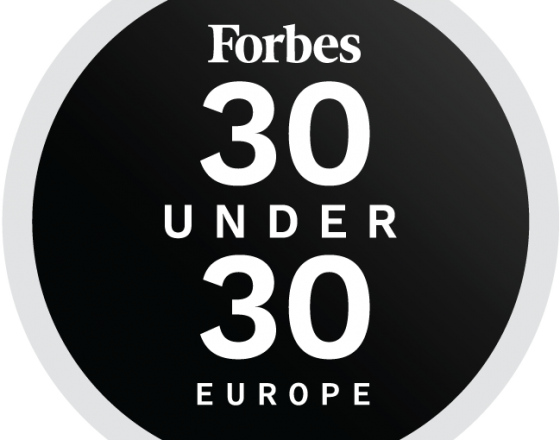Landmark For Environmental Awareness
The Greater Manchester Combined Authority Green Summit, held on the 21st March 2018, has been hailed as a landmark event for environmental awareness.
The summit mainly focused on the intentions of the Mayor, Andy Burnham, to make Greater Manchester the UK’s greenest city, with added emphasis on digitalisation and decarbonisation.
It brought together environmental experts, interest groups, partner agencies, academics and local people to accelerate the regions green ambitions.
SCATTER
Just before Christmas last year, Solisco were invited to join an expert group workshop on the topic of Transport and Energy. The research from these group discussions provided good insights for the formation of a new tool called SCATTER. This is a UK city-wide GHG modelling tool, with illustrative data outputs informing the GM Green Summit. It’s a tool to model GHGs of existing, well established interventions that have already been adopted elsewhere, and it delivers a high level, intervention specific, indication of relative social and economic impacts. We were pleased to attend this workshop and delighted to be invited back for the Green Summit.
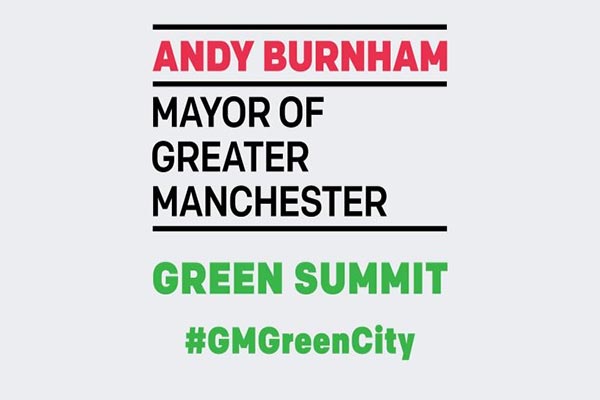
What is Manchester’s Target?
Greater Manchester is currently on track to meet its 2020 target of a 48% carbon emissions reduction from the baseline 1990 figure.
However, Burnham claims greater effort is required to make significant reductions on anthropogenic climate change. He hoped the Green Summit would catalyse cooperation across sectors in order to achieve carbon neutrality by as soon as 2040 rather than 2050; the date agreed upon by the UK government and scientific community.
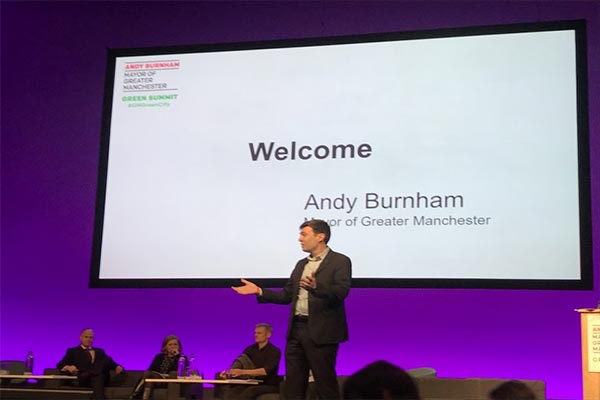
Speakers During Manchester’s Green Summit
Dr Kevin Anderson
Professor of Energy & Climate Change, University of Manchester
During his opening statement, Dr Kevin Anderson stated that the need for imminent action on climate change was vital. He added that following the crowd so to speak is a dangerous approach leading to too slow a human response in adaptation and mitigation.
His slides mirrored similar messages to the latest IPCC report and Paris COP21 pledges. He emphasised a need for a reduction in carbon intensive practices through the avoidance of technocratic frauds and unproven technologies, such as offsetting and geo-engineering respectively.
GMCA
GMCA’s intentions to meet the Paris 2°C pledge comes with an energy budget of 71 million tonnes of CO2 for 2018 onwards.
By addressing carbon emissions collectively, it is believed a more effective set of actions can be established. The GMCA aims to achieve a holistic reduction by; retrofitting buildings with cleaner materials and technology, passive housing, reducing flying, increasing emphasis on virtual communication to reduce travel emissions, clean air zones or congestion charges for polluting vehicles, more and improved electric vehicle charging facilities and greater renewables to the grid.
Dr Anderson believes that these changes will only be effective if the technology is effective, the transition is sustainable and rapid, social perception is supportive of the claim and economic models are fit for the purpose.
Councillor Alex Ganotis, Cabinet Member for Policy, Finance & Devolution
Councillor Ganotis had a clear aim; for the Greater Manchester area to be one of Europe’s leading green cities. To achieve this, the new tool SCATTER is used.
Setting
City
Area
Targets
Trajectories
Emissions
Reduction
Scatter is funded by the Department for Business, Energy and Industrial Strategy (BEIS) and it aims at achieving climate action for Greater Manchester. As part of the Environment Charter, a carbon neutral city region with thriving natural environments and a zero-waste economy is proposed.
There is a greater emphasis on sustainability with the refinement of travel networks, improved environmental education and locally-produced food supplies.
Environmental education will encompass expert workshops, online surveys, listening events, summits, carbon literacy and training, apprenticeships and open forums. There will be greater input from the public and businesses on decision-making in order to make living practices and business practices more sustainable for a cleaner economy.
Energy Plan
A Greater Manchester Energy Plan will provide a roadmap for decarbonising, managing and reducing electricity and gas supply including heat, waste and ultra-low emission vehicles.
Emissions from the energy and transport sectors will be kept down with affordable clean public transport systems, more efficient buildings through retrofit technologies and greater renewable energy contribution to the regions energy grid. As 95% of transport emissions are from road vehicles incentives for increasing walking and cycling will be achieved through better infrastructure services as well as policy targeting.
Emma Howard, Chair, Environment Agency
Emma Howard claims that the biggest climate change related threat facing the UK is increased flooding. However, by attracting enough attention from industry, it is possible to act on mitigating flooding risks. Focusing on cleaning air and water, including rainwater begins with reducing pollution.
There is potential for projects to attract private investment, providing jobs and supporting the economy. Adopting a circular economy ethos for businesses and society can have significantly positive impacts on Manchester’s collective environmental footprint.
Mike Barry, Director of Sustainable Business, Marks and Spencer
In 2007 Marks & Spencers’ Plan A proposed an ambitious programme for reducing the retailer’s carbon footprint by cutting waste, engaging customers, and scaling up its use of clean technologies. Its success effectively shaped the world of corporate sustainability.
A recently revised version of Plan A aims towards operating a zero waste business and value chain by 2025.
‘It sets out fully-approved Science-Based Targets to cut its worldwide emissions by 80 per cent from 2007 levels by 2030, and then by 90 per cent cut by 2035. Moreover, M&S wants to cut emissions from its supply chain by 13.3 million tonnes by 2030’ (Holder, 2017).
M&S aims to further drive sustainability in businesses and redefine the role companies have on the climate change movement.
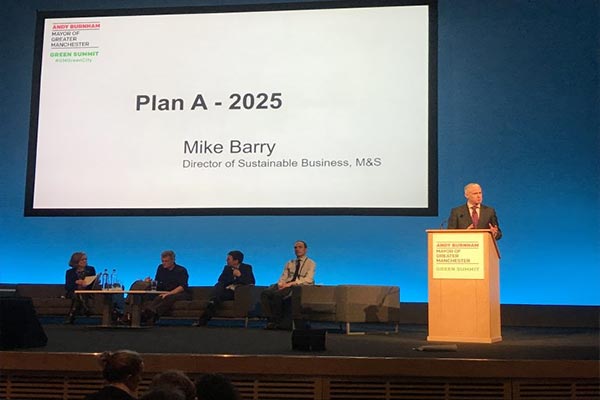
Amer Gaffar, Manchester Fuel Cell Innovation Centre
Part funded by the EU Regional Development Fund, the Manchester Fuel Cell Innovation Centre is a landmark new technology hub based in Manchester Metropolitan University. This $6.5M facility comprises of 23 full-time researchers operating alongside 50 businesses with the focus of developing both hydrogen and fuel cell projects to create emission-free energy for the Greater Manchester area.
Anne Selby, Chief Executive, the Wildlife Trust for Lancashire, Manchester & Merseyside
By working with people throughout the city, the Wildlife Trust aims to increase public awareness and contact with wildlife-friendly gardens through the introduction of interactive maps and pilot hubs. Increase action on garden improvements for wildlife with increased support facilities and studies to gain a better understanding of the networks, behaviours and habitats of the regions ecology.
Feedback Panel & Q&A
John Alker – UK Green Building Council
Paul Bircham – Electricity NW
Pete Abel – Manchester Friends of the Earth
Chris Matthews – United Utilities
Lucy Danger – Fareshare
Beth Perry – Just Cities
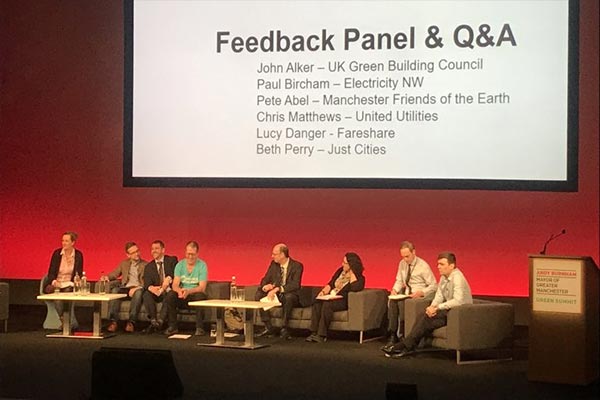
An interesting discussion took place and these were the main points we took from it:
- DEFRA – As part of the Government’s 25-year environment plan launched at the start of the year, Greater Manchester was announced as the UK’s ‘Urban Pioneer City Region’, bolstering the region’s green credentials and providing a significant boost to its ambition to become the greenest city region in the UK.
- STREETS – a campaign launch to create safer streets for cyclists
- PUBLIC TRANSPORT – powers to regulate buses to achieve integration, congestion announcement -stagger work times to avoid peak traveling.
- CLEAN AIR ZONES – enforcements to be implemented
- COMMERCIAL BUILDINGS – to be more green – they are currently using 50% more energy, offer solutions – pilots, retrofitting, creating jobs.
- NATURAL CAPITAL – embrace and promote more green spaces
- FRAMEWORK – Getting the spatial framework right
- COST – look at investments from a life time cost persepective – change the British mentality of building cheap and cheerfully and instead create high quality buildings and infrastructure.
You can watch the full edition of the Greater Manchester Green Summit on the BBC website here.
Article References
Greater Manchester Low Carbon Hub. (2018). Amer Gaffar. [online] Available at: http://gmlch.ontheplatform.org.uk/users/amer-gaffar [Accessed 6 Apr. 2018]
Greatermanchester-ca.gov.uk. (2018). Green Summit | Green Summit | GMCA. [online] Available at: https://www.greatermanchester-ca.gov.uk/info/20005/green_city_region/117/green_summit/1 [Accessed 6 Apr. 2018].
Holder, M., (2017). M&S’ Mike Barry: ‘The first Plan A was a dress rehearsal, now we really want to push on as a sustainable business’ . Business Green. [online] http://www.businessgreen.com. Available at: https://www.businessgreen.com/bg/interview/3011587/m-s-mike-barry-the-first-plan-a-was-a-dress-rehearsal-now-we-really-want-to-push-on-as-a-sustainable-business [Accessed 6 Apr. 2018].
Manchester Metropolitan University (2018). Manchester Fuel Cell Innovation Centre · Manchester Metropolitan University. [online] Available at: https://www2.mmu.ac.uk/science-engineering/consultancy/manchester-fuel-cell-innovation-centre/ [Accessed 6 Apr. 2018].
BBC: https://www.bbc.co.uk/events/exmxp6/live/c23q2m
